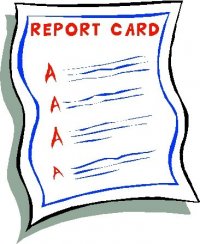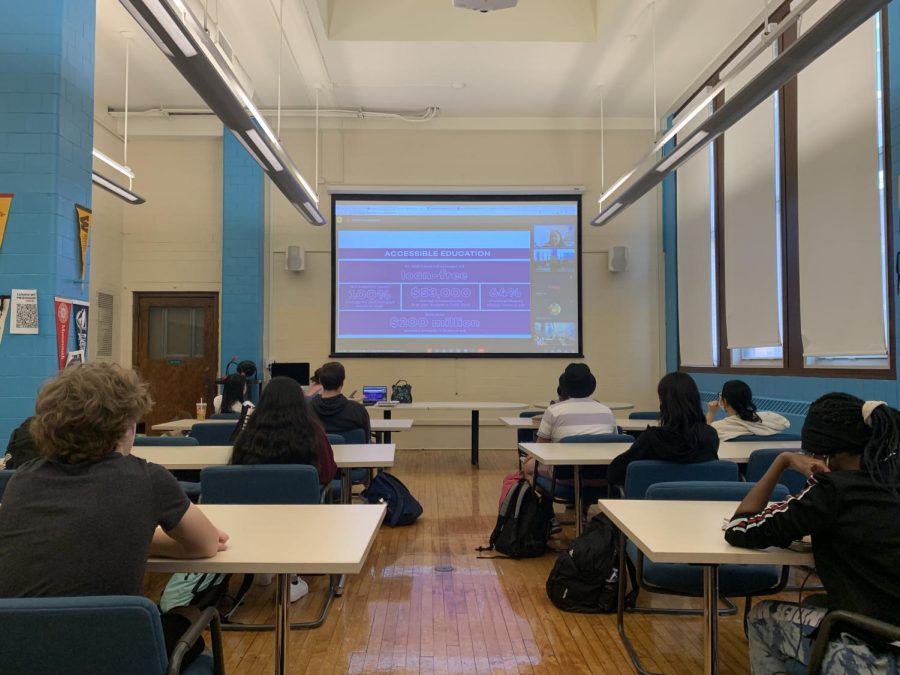CPS mandates all schools move to new scale. Teachers worry less stringent standards may lead to lower student performance.
By Cherrell Anderson
On the first day of school, after a year-long deliberation among the staff and pressure from parents, Lane students were welcomed with the new 10-point grading scale. This change was mandatory for all departments.
The push for a new standardized grading scale began with some of the parents of elementary CPS students. They complained that their children were at a disadvantage when it came down to getting into selective enrollment schools, compared to students at schools with lower grading scales.
“CPS reacted by standardizing the grading scale across the city,” Dr. LoBosco said. “We had a teacher committee survey [Lane’s] staff with two different grading scales to get our feedback. We listened to the parents and tried to make them happy.”
The two scales were the 10-point scale and a harder scale used by Jones College Prep High School in Chicago.
Last year at Lane, every department had their own scale, but there were some challenges when it came to the teacher/student online resource, Gradebook. The website was based on a five point scale for Honors and AP classes and around a seven to eight point scale for Regulars.
“If teachers made their own scales, they would have had to override Gradebook’s scale so it would show their students’ correct grades,” LoBosco said. “Teachers could only override the grades at certain times and some would forget to do so.”
Challenges like these would turn an A into a B on Gradebook, a B into a C, a C into a D, etc, which would sometimes make parents unnecesarily upset with their children who brought home report cards with grades worse than what they really had in their classes.
With all the departments now using the 10-point scale, some students are already noticing a difference in their academic performance compared to last year.
“The 10-point scale is helping me a lot, actually,” said Arielle Steward, Div. 462. “Last year, if I [had] a 91 percent, I would’ve gotten a B. Now it’s an A.”
“Ever since [I’ve been] a freshman, I thought the grading scale was too [tough]. I feel the new scale is fair because 94 percent should never be considered a B,” said Julian DiMaio, Div. 272, who was referring to last year’s Honors and AP grading scale.
While students are enjoying the benefits of an easier grading scale, some still question whether it is fair for students in Honors and AP classes, who are expected to work harder than they would in Regulars classes. Some even argue that the scale is not appropriate for a college preparatory school like Lane.
“The 10 point grading scale for a school that isn’t a college prep is fair,” Steward said. “However, [Lane] is a college preparatory school. Therefore we are held at a higher standard and [the new scale] is a bit too easy.”
“AP classes are harder than Honors, but they aren’t that hard that they should be knocked down to a 10 point scale,” said Anthony Surganov, Div. 264.
The 10 point grading scale has changed some teacher’s expectations of their students. Some teachers have rearranged their scoring criteria.
“For something worth 20 points, I used to give 20 just for the effort. Now, I actually read through all of their answers,” said English teacher, Ms. Coleman.
“I’m not a big fan of this grading scale,” said history teacher, Mr. Allegreza. “This is a college prep; [students] should be performing at a higher level. When they [go to college], they’re going to be in a for a very unpleasant surprise. Colleges are not going to be easy on them.”
The news about the 10 point grading scale reached some Lane alumni, some of whom had strong opinions.
“I feel a little bitter about Lane having an easier grading scale because I wanted my senior year to be very easy going,” said Class of 2011 alumni, Christine Javanillo. “I honestly believe that my college options would have had more of a variety because my GPA would have looked better.”
“I don’t feel anything towards the new grading scale. The old one made me work harder for my grades, whereas on the 10 point scale, people will have an easier time and aim for the minimum,” said Class of 2011 alumni, Kanza Ahmed. “Ultimately, academic success and failure depends on the student, not the grading scale.”
Ahmed’s belief that the 10 point scale leads to students putting forth less effort refers to what educators call “The Pygmalion Effect.” The Pygmalion Effect was formulated by college professor Robert Rosenthal and elementary school principal Lenore Jacobson. Their research showed that teacher expectations influence student performance. If a teacher has high expectations for students, the students will perform better. If a teacher has low expectations, the students will not perform as well. The same applies to managers’ expectations of their employees in the workplace.
Although the 10 point scale is easier than the previous scale, some students say that academic success is still up to the student.
“[AP students] are still being challenged even with the new scale, said Natalie Frazier, Div. 281.
“I think it’s more about the effort and the motivation that each student has,” Steward said.




